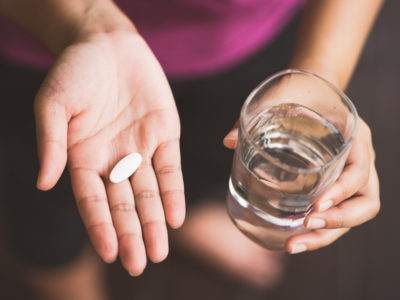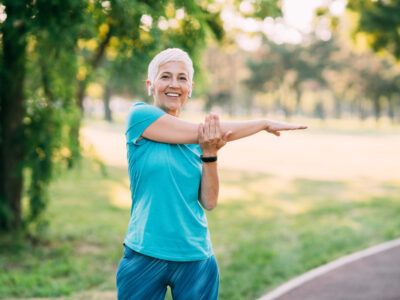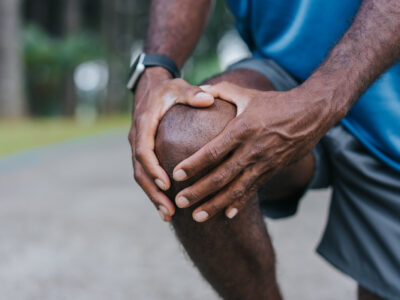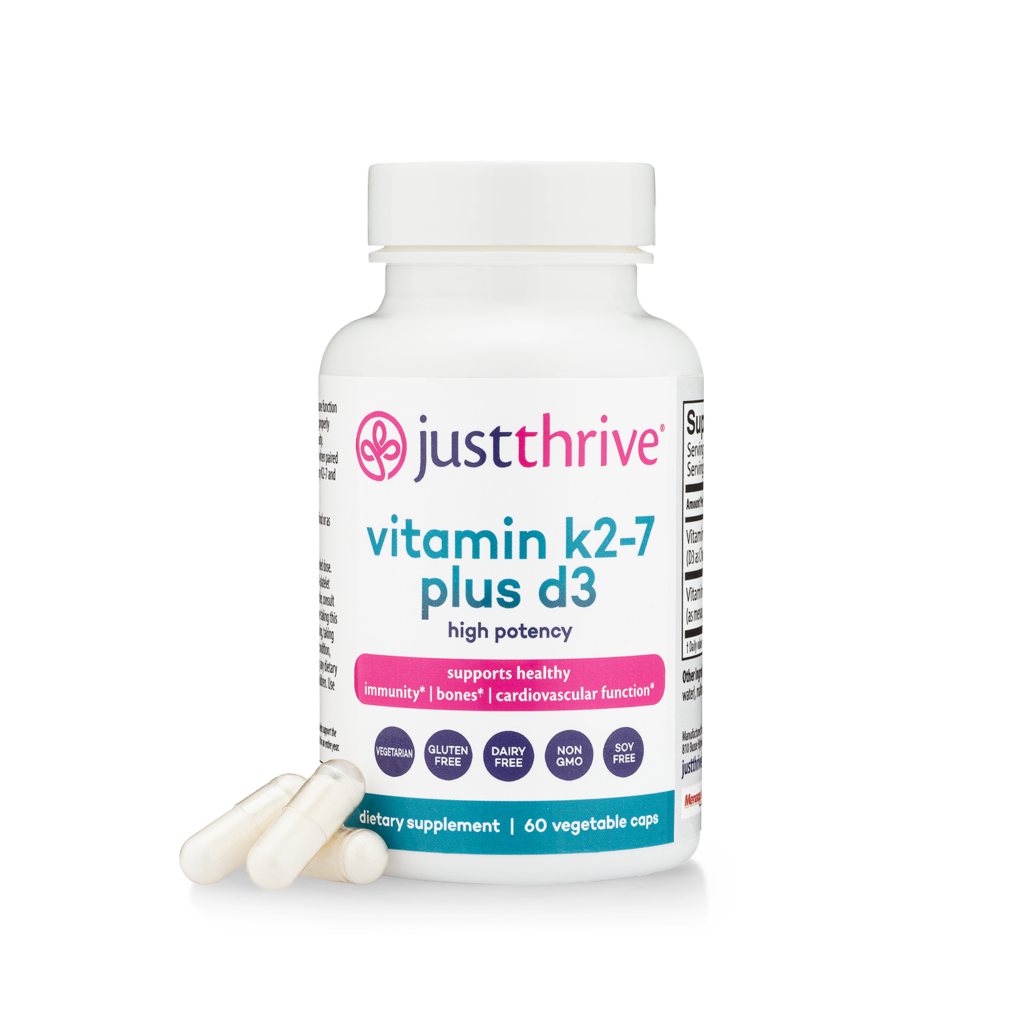Table of Contents[Hide][Show]
- What Is Osteoporosis
Osteoporosis Prevention+−
- Focus on Calcium
- Get Enough Vitamin D
- Your Complete Guide to Vitamin K2 (MK-7)
- Exercise Regularly
- Adopt a “Healthy Bones” Lifestyle
- The Best Exercises For Seniors
- Watch Your Gut Health
- How to Improve Mobility
- Longevity Training: The Secret to Long-Term Health
- The Surprising Connection Between Joint Pain and Gut Health
We’ve all heard the horror stories: someone barely trips, yet they somehow end up with a broken bone. It’s one of those things that people start to worry about as they get older.
But what if that could be prevented?
While you can’t hit pause on aging, you absolutely can, and should, protect your bones and lower your risk of osteoporosis. And the good news? It doesn’t take a complete lifestyle overhaul. You just need a few smart, bone-friendly strategies.
Let’s take a closer look at what you can start doing today to keep your bones strong, healthy, and osteoporosis-free.
What Is Osteoporosis
Despite their tough appearance, your bones are living tissue, constantly being broken down and replaced. But when the production of new bone cells can’t keep up with the loss of old ones, osteoporosis occurs.
Osteoporosis causes your bones to become weak and brittle, making them more likely to fracture or break. Weaker vertebrae can also lead to an abnormal spinal curvature, sometimes referred to as a hunched back.
Unfortunately, as we age, bone production slows down. Eventually, bone mass is lost faster than it can be created. That’s why older adults are more likely to fracture or break a bone if they fall. It’s also why conditions like a hunched back become more common with age.
Osteoporosis isn’t exclusive to older adults. Although it can affect anyone, some groups are naturally at a higher risk of developing osteoporosis.
Be especially vigilant with your bone health if you:
- Are a postmenopausal woman
- Are over the age of 50
- Don’t get enough calcium
- Have a family history of osteoporosis
- Are naturally small and thin
- Smoke
- Take certain medications (talk to your doctor for more information)
But just because you fall into one of those categories doesn’t mean you have no options. Your health is always in your hands.
Let’s look at some of the ways you can build bone health and prevent osteoporosis.
Osteoporosis Prevention
Want to keep your bones strong and healthy as you get older? Here are some things you can do to help prevent osteoporosis—at any age.
Focus on Calcium
You probably already know that calcium helps build and maintain healthy bones and teeth, an important part of avoiding osteoporosis.
But are you getting enough? Here is the U.S. Recommended Dietary Allowances (US RDA) for calcium by gender and age.
- Men, ages 19-70: 1,000 mg
- Men, ages 71 and older: 1,200 mg
- Women, ages 19-49: 1,000 mg
- Women, ages 50 and older: 1,200 mg
Your body doesn’t produce calcium, so it’s important you consume it through diet or supplements. Some excellent sources of calcium include:
- Dairy products
- Dark green leafy vegetables, such as broccoli and kale
- Dried fruit
- Fish with soft, edible bones (like sardines)
- Tofu
- Calcium-fortified food and drinks
If your dietary preferences or restrictions don’t allow you to eat enough calcium, consider taking a daily supplement. Just be careful not to overdo it! Excessive calcium can lead to hypercalcemia, a condition that can actually weaken your bones, create kidney stones, and cause other side effects.
Get Enough Vitamin D
Getting enough calcium is only the first step in building stronger bones. For your body to properly absorb calcium, it also needs vitamin D. And shockingly, studies show that about 1 billion people worldwide and up to 35% of the U.S. adult population are deficient in vitamin D.
Now, you’ve probably heard people say that they’re going to “load up on vitamin D” as they head outdoors. Maybe you’ve even said it yourself. And UV rays do, in fact, trigger your body to produce vitamin D3.
But the truth is, sunshine alone isn’t enough to produce the amount of vitamin D your body needs for optimal calcium absorption. Maybe it’s a cloudy day. Or you’re stuck indoors, working or going to school. Plus, you’ll be more covered up in winter, with less skin exposed to sunlight. And in the summer? Sunscreen can decrease the formation of vitamin D. It’s tough to measure, on a daily basis, just how much sunlight (and vitamin D) you’re getting.
Unfortunately, there are very few foods that contain sufficient amounts of vitamin D, making it difficult to get from your diet alone. Fatty fish, fish liver oils, egg yolks, cheese, and some mushrooms are some of the best sources. Vitamin D-fortified foods, such as bread, cereal, and dairy products, can also boost your intake.
So if neither sunlight nor your diet provides you with enough vitamin D, what can you do? Taking a vitamin D supplement is an easy way to make sure you’re getting enough of this vital nutrient to support your calcium absorption—and your bone health.
Related
Your Complete Guide to Vitamin K2 (MK-7)
Learn how vitamin K2 MK7 differs from vitamin K1 and discover its functions and benefits, signs of deficiency, and how you can incorporate it into your daily diet.
Exercise Regularly
Exercise is good for many things: weight management, mental health, muscle tone, improved sleep, and more. But did you know that exercising—specifically, strength or resistance training—can also help prevent osteoporosis?
As we mentioned earlier, your bones are living tissue. When they’re placed under stress, your body responds by producing more bone cells. The result? Stronger, denser bones that can help prevent osteoporosis.
For maximum bone health, focus on these two types of exercise.
- Weight-Bearing Exercises: This includes any exercise or activity that makes your body work against gravity. These movements put pressure on your bones, signaling your body to build more bone cells. Walking, jogging, running, dancing, hiking, and pickleball are all excellent examples of weight-bearing exercises.
- Strength Training Exercises: The stronger your muscles become, the more they pull on your bones, stimulating bone cell production and increasing bone density. Try strength training activities such as lifting weights, working out with resistance bands, or doing body weight exercises such as pushups, squats, or pull ups. For best results, aim for 2–3 30-minute workout sessions per week.
Adopt a “Healthy Bones” Lifestyle
It’s never too early, or too late, to start protecting yourself from osteoporosis!
Here are some things you can do to build and maintain healthy bones.
- Stop smoking—not just for your bones, but for every aspect of your physical and mental health.
- Limit the amount of alcohol you drink.
- Eat a healthy, well-balanced diet. Focus on organic, nutrient-dense foods; skip over-processed foods and sugary snacks.
- Stay active. Not just with resistance training, as we mentioned earlier, but with consistent daily movement.
Related
The Best Exercises For Seniors
Just because you’re getting older doesn’t mean you can’t still be fit, active, and glowing with health and energy. Let’s take a look at some of the best exercises for seniors and how they can benefit your mind and body.
Watch Your Gut Health
The secret to bone health could lie someplace completely unexpected: your gut.
Your gut microbiome is home to both beneficial (good) bacteria and pathogenic (bad) bacteria, which coexist in a precarious balance. With limited space available, when one type of bacteria flourishes, it leaves less space and fewer resources for the other.
Ideally, robust beneficial bacteria colonies will crowd out the colonies of bad bacteria, leading to better overall health and wellness. Unfortunately, the opposite is the case for most people. The colonies of pathogenic bacteria dominate your microbiome, a condition known as dysbiosis.
One recent study highlights the link between gut health and bone health. More specifically, gut bacteria have been shown to play a role in supporting nutrient absorption (including calcium) and regulating bone density. Another study shows the role gut microbes play in bone strength and density, both key factors in preventing osteoporosis.
With this connection in mind, nurturing a healthy gut microbiome with spore probiotics becomes part of protecting your bones and preventing osteoporosis.
Probiotics are beneficial bacteria that are similar or even identical to the ones already living in your gut. When you take probiotics, these helpful microbes work their way through your digestive tract, eventually landing in your microbiome. There, they join forces with existing colonies of good bacteria, adding to both their quantity and quality. Over time, these fortified colonies help rebalance your gut, supporting your total-body health. And that includes stronger, healthier bones.
We’re big fans of Just Thrive Probiotic, an award-winning probiotic that features four powerful bacterial strains.
- Bacillus indicus HU36™, which produces 15 potent antioxidant strains right in your gut, where your body can easily access them
- Bacillus subtilis HU58™, clinically-proven to help balance your gut and improve the absorption of nutrients such as bone-supporting calcium
- Bacillus clausii, the only bacterial strain known to resist the damage done by antibiotics, and helping to repopulate your gut with good microbes
- Bacillus coagulans, a superstar at balancing your gut and crowding out pathogenic bacteria
And thanks to these strains’ natural endospore shell, an incredibly effective armor against the harsh digestive environment, each Just Thrive Probiotic capsule is guaranteed to arrive in your microbiome 100% alive and ready to support your gut—and your bones.
Final Thoughts
Start giving your bones the support they deserve!
Aging is inevitable, but weakening bones don’t have to be. You have more control over your bone health than you might think. And while it’s true that bone density naturally decreases with age, that doesn’t mean you’re destined for weak or brittle bones.
With the right nutrients, smart lifestyle habits, and a little consistency, you can build strong, healthy bones and protect yourself from osteoporosis well into your golden years.
Every bone-friendly choice you make today adds up to stronger, healthier bones tomorrow!
You May Also Like…






